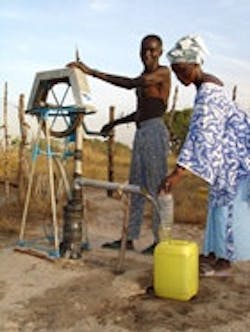Senegal Water Infrastructure Project Is Completed
Source JM Eagle, the Earth Institute at Columbia University
Pipe manufacturer JM Eagle and the Earth Institute at Columbia University have announced the official completion of a new water infrastructure system that is bringing safe drinking water to more than 13,500 people in one of the poorest and most remote areas of Senegal. Begun last summer as part of the Millennium Villages Project, the new water supply network consists of almost 70 miles of plastic pipe that connects to 63 villages. Additionally, more than 99% of the region now has easy access to water via 81 new public taps as well as 11 animal troughs.
Among the numerous participants at the official “Turning on the Taps” ceremony in the village of Leona were Senegalese government officials and dignitaries, as well as Earth Institute Director Jeffrey Sachs and JM Eagle CEO Walter Wang. The event marks the completion of the first phase of a broader JM Eagle/Millennium Villages initiative to build similar water infrastructure systems in five other African countries including Mali, Ghana, Uganda, Tanzania and Rwanda. Developed by the Earth Institute at Columbia University, the Millennium Villages Project fights extreme poverty at the village level through community-led work that is supported by a variety of public and private businesses and organizations.
In addition to donating the raw materials for building the water network—including close to $1 million worth of high-strength polyvinyl chloride (PVC) water pipe—JM Eagle also funded two full-time engineers. This material and expertise was used to extend an inadequate water distribution system that was reaching only one-third of the communities, so that almost all of the Potou area in northwestern Senegal now has access to clean drinking water as well as non-potable water for irrigation.
“This is a path-breaking partnership that illustrates how the poverty trap can be broken even in the very poorest places in the world,” Sachs said. “Just as importantly, it is serving as a bellwether for other areas throughout Africa where government leaders and local communities are aiming to emulate what has been accomplished in Senegal.”
Sachs noted that working with JM Eagle was vital because their involvement helped to secure support for the project from the government of Senegal, which ultimately dug additional wells and built water towers as part of the overall initiative. “Public-private partnerships are essential for solving the problems of extreme poverty and sustainable development, and as evidenced by this project, can have a major impact in solving global problems such as water scarcity in developing nations,” he said.
“When we first arrived in Senegal there seemed to be much disparity and little hope among many of the villagers we met due to the extreme poverty,” Wang said. “To see that attitude replaced with joy and smiles when they realized they now have safe water in their villages is gratifying beyond words.”
Wang noted that while water is the vital link to health and economic advancement across the globe, the world is facing a crisis, not just in the availability of water, but in its management. “By helping to develop the necessary water infrastructure in Senegal, we are fulfilling an immediate need, as well as providing the basis for long-term, sustainable solutions that are the link to health and economic prosperity in communities throughout the region.”
Source: JM Eagle, the Earth Institute at Columbia University
